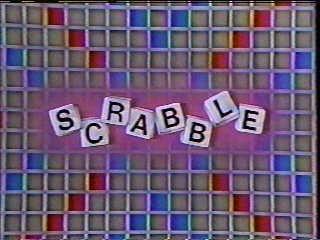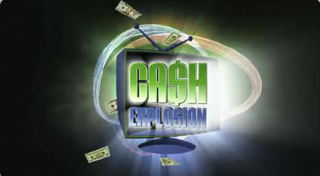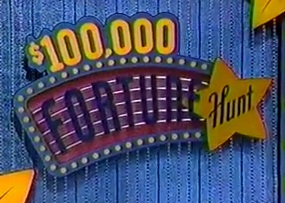
Scrabble is an American television game show based upon the board game Scrabble. Contestants competed in a series of rounds to fill in words within a crossword puzzle for cash. Muriel Green of Exposure Unlimited developed the idea for a television game show based upon the board game concept. During 1983, Green convinced Selchow and Righter, who at that time owned the Scrabble board game, to license Exposure Unlimited to produce the game show. Exposure Unlimited co-produced the show with Reg Grundy Productions, and licensed the show to NBC. Scrabble aired on NBC from July 2, 1984, to March 23, 1990, and again from January 18 to June 11, 1993. Chuck Woolery hosted the program. Jay Stewart was the announcer for the first year. Charlie Tuna replaced him in the mid-1985 and remained through the original run and the entirety of the 1993 revival.

Lingo is an American television game show with multiple international adaptations. In it, contestants compete to decode five-letter words given the first letter, similarly to Jotto, with each correctly guessed word earning number draws to attempt filling in a Bingo card.

Des chiffres et des lettres is a French television programme. It was created by Armand Jammot and tests the numeracy skills and vocabulary of two contestants. It is one of the longest-running game shows in the world, and the inspiration for Countdown on Britain's Channel 4.

Now You See It is an American television game show created by Frank Wayne for Mark Goodson-Bill Todman Productions. The object of Now You See It is to answer general knowledge trivia questions by finding the answers hidden in a grid, similar to a word search puzzle.

Chain Reaction is an American television game show created by Bob Stewart, in which players compete to form chains composed of two-word phrases.
Chain Letters was a British television game show produced by Tyne Tees and Barry & Enright Productions. The show was recorded at their City Road studios in Newcastle Upon Tyne and first broadcast on ITV in the United Kingdom from 7 September 1987 to 6 July 1990, then again from 2 January 1995 to 25 April 1997.
BrainTeaser was a British game show based on the original Dutch format of Puzzeltijd. The show was broadcast live, with phone-in viewer puzzles being announced and played during the show in addition to the studio game. During its run from 5 August 2002 to 7 March 2007, it aired on Five Mondays to Fridays, usually for an hour around lunchtime, and was fronted by various presenters rotating with one another. Beginning in August 2005, a version of the show that exclusively focused on viewer participation was broadcast in a four-hour long block on YooPlay TV every day after the Five broadcast, as part of a thirteen-week trial.
Wheel of Fortune is an Australian television game show produced by Grundy Television until 2006, and CBS Studios International in 2008. The program aired on the Seven Network from 1981 to 2004 and January to July 2006, aired at 5:00pm from 1981 to 1989 and from 2004 to 2006 and at 5:30pm from 1989 to 2003, and is mostly based on the same general format as the original American version of the program.

Wheel of Fortune is a British television game show based on the American show of the same name created by Merv Griffin. Contestants compete to solve word puzzles, similar to those used in Hangman, to win cash and prizes. The title refers to the show's giant carnival wheel that contestants spin throughout the course of the game to determine their cash and/or prizes.
La Roue de la fortune was the French version of the US game show Wheel of Fortune.

Cash Explosion, known as Cash Explosion: Double Play from 1989 until 2012, is the official Ohio Lottery TV game show, which is broadcast on television stations throughout Ohio. The show originated in Cleveland and is now taped by Mills James Productions in Columbus, Ohio.

There are two Philippine versions of Wheel of Fortune. The first was aired on ABC aired from November 19, 2001 to May 31, 2002. It was hosted by Rustom Padilla and Victoria London. The second and more recent one was a program that aired on ABS-CBN, with Kris Aquino as main host, while Zara Aldana and Jasmine Fitzgerald alternated as puzzle assistants for each puzzle. Aquino's version started on January 14, 2008.
La ruleta de la fortuna or La ruleta de la suerte is the Spanish version of Wheel of Fortune. The first incarnation ran from 1990 to 1992 in Antena 3, the second one from 1993 to 1997 in Telecinco, and then, after a nine-year hiatus, a revival has been made on Antena 3 beginning in 2006. The show also airs internationally via Antena 3 Internacional.

Bingo America is an American game show broadcast by Game Show Network. The series follows two contestants as they try to compete to win up to $100,000. Additionally, the series lets at-home viewers print bingo cards online that allow them to play along with the show to win small amounts of money for themselves.
Lingo is a British game show based on the American programme of the same name, the original iteration of the programme was made by Thames Television and Action Time for ITV1, running for a single series with host Martin Daniels from 12 May to 14 July 1988. A revived version has also aired from 1 January 2021 hosted by Adil Ray.

100,000 Fortune Hunt is an American lottery-based game show originating in the state of Illinois. It debuted on September 16, 1989, and aired on Saturday evenings from 1989 to 1994 on WGN-TV in Chicago ; it was also broadcast on WGN's national satellite feed. Jeff Coopwood hosted the first season, with the rest of the run being hosted by Mike Jackson. Linda Kollmeyer served as the hostess during the entire run with Bill Barber as the announcer.

Un, dos, tres... responda otra vez, usually shortened as Un, dos, tres..., and named Un, dos, tres... a leer esta vez in its last season, was a Spanish prime-time television game show, created by Narciso Ibáñez Serrador, which was broadcast on La Primera Cadena of Televisión Española for ten seasons from 1972 to 2004.
Wordplay is a game show presented by Jenny Powell and sometimes Jenni Falconer. It aired live weekdays from 23 March to 31 July 2009 on Channel 5 and was axed after only one series.

Lingo is a television game show that aired in the Netherlands between 1989 and 2014, and returned in 2019 on the commercial channel SBS6. Since 2022, it is aired on the commercial channel Net5. The format consists of a word game that combines Mastermind and Bingo.











